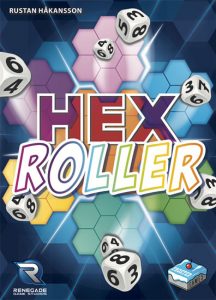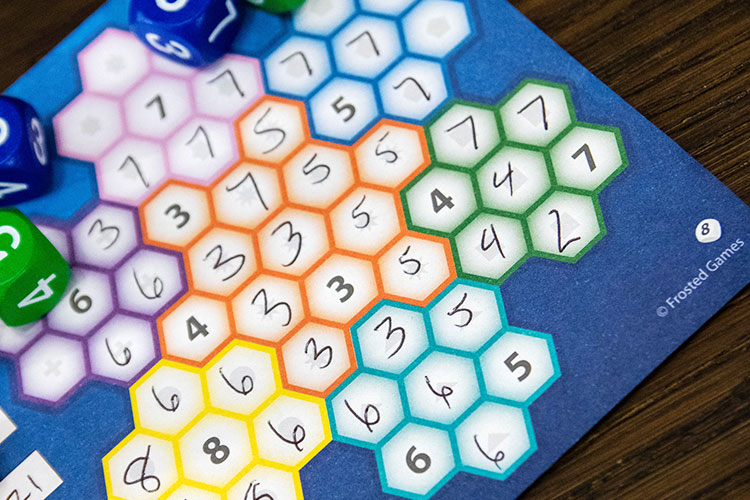 Roll and writes. Everywhere you look, a roll and write. Wandering the aisles of gaming conventions, you’ll run into the “hottest new roll and write” every 50 feet. That said, generally, I love them. But roll and write just doesn’t carry the same meaning that it used to.
Roll and writes. Everywhere you look, a roll and write. Wandering the aisles of gaming conventions, you’ll run into the “hottest new roll and write” every 50 feet. That said, generally, I love them. But roll and write just doesn’t carry the same meaning that it used to.
In the not-so-distant past you could assume a R&W is a quick playing, easy to explain dice game. Now we have flip and writes though. Sometimes there are lots of rules. Even multiple sheets. Drafting and combos and end game goals. But not today. Hex Roller harkens back to the good ol’ days of 2017 when our roll and writes just had a pad of paper and some numbered dice.
Hex Roller plays in about 10 minutes and accommodates 1 or more players.
Gameplay Overview:
In Hex Roller, each player receives a scoring sheet that is made up of 7 different scoring areas. Within each scoring area are printed numbers 3-8, each appearing twice. All of the sheets are identical, and players will have the same dice to use each round as their opponents, so the game centers around making good use of whatever results come up.
Each round one player will roll all the dice and group them by number. The dice have values between 3-8. Each player will pick two of the groups and write the chosen number on their sheet the number of times it was rolled. For instance, if there is a group of three dice with an “8” value, you can write three “8’s” on your sheet. The first “8” you add to your sheet must be adjacent to another 8, either one that is preprinted or one that you wrote in a previous round. Each subsequent number you write from the same group must be adjacent to the one you wrote before. So, you will start building a path around the sheet of like numbers.

Whichever groups you choose, there are two sets of boxes in which you’ll write down the value of the dice you chose. This will come into play at end of game scoring, but incentives you to choose a variety of numbers.
There are three bonuses you can use throughout the game, but only one each round. You can write a 2 in any empty hex, write down one more than the rolled number of dice, and choose a third group of the rolled dice.
The game ends after 6 or 7 rounds and you’ll score points in a variety of ways. For each colored section, if it is completely filled, score the number that appears most often. If you connect the preprinted numbers with using the same number, you’ll score that many points. Straights based on the numbers you wrote on the bottom of the sheet. You’ll score points equal to the highest number you reach in each row without missing any Finally, two points for each unused bonus.

Game Experience:
Roll and writes have been trending heavier and more complicated recently. And while I certainly love some of those games, I’m a big fan of this return to the simple yet interesting world of just writing numbers down wildly.
To claim the Hex Roller is the most interesting game in the world would be a stretch, but it gives its players plenty to consider. It uses a mix of spatial decisioning and route building in a way that isn’t common to roll and write games. It’s impossible to make all of the connections and the ones worth the most points have the greatest distance between them. Should you attempt to connect the 8s, which can be a bit of a long shot and precludes you from making connections for some of the other high numbers. Or just forego most of the connection and take whatever the biggest groups are to attempt to fill in as many sections as possible.

It feels a little point-salady in that way. All of the options will help you get somewhere, it’s just a matter if you get where you want to be or not. And sometimes you’ll find yourself playing with fire. Maybe you are two spots away from making that long connection between 8s, but the roll includes three 8s. That won’t do it as you must write in every number in the group. It makes for some interesting trade-offs and almost a press your luck mini-game to see if you can hold off to get all the numbers you need at once.
There isn’t enough depth here for Hex Roller to be the star of the show at your game night, but it plays so quickly that you’ll be able to fit it somewhere in your evening. It’s a great filler length game and each sheet includes two slightly different versions. The back side is a little less forgiving, having only 6 rounds and some slightly smaller areas to fill in. The bonuses are integral to making Hex Roller really work. It makes the game feel just forgiving enough that everyone should enjoy themselves but still reward thoughtful decisions.
Final Thoughts:
The idea of categorizing all roll and writes together may be antiquated. While calling Hex Roller a throwback to 2 years ago is somewhat a joke, it’s also definitely true. It’s simple to explain and play. Yet, it still feels different than the vast and ever-increasing number of roll and writes hitting the shelves of your friendly local game store. While the lack of any attempt at theme certainly makes it hard to stand out, the gameplay is certainly worth the price.
Hex Roller works with groups of hardcore gamers, kids, and nongamers alike. The best thing I can say about Hex Roller is I’ve still never played it just once. The double-sided sheet having a slightly harder mode is a brilliant decision. Considering it plays so quickly you’ll rarely not get everyone at the table to agree to give it one more go before you put it away.
Final Score: 4 Stars – A great addition to the roll and write arsenal. Will work well with families and gamers alike who want something fun they can play quickly.
 Hits:
Hits:
• Simple rules explanation and quick playing time.
• Lots of variety in ways to score points.
• Bonuses give you some flexibility if you make a mistake.
Misses:
• Zero player interaction
• Not much difference between plays
• No attempt to theme the game to make it more appealing.






















